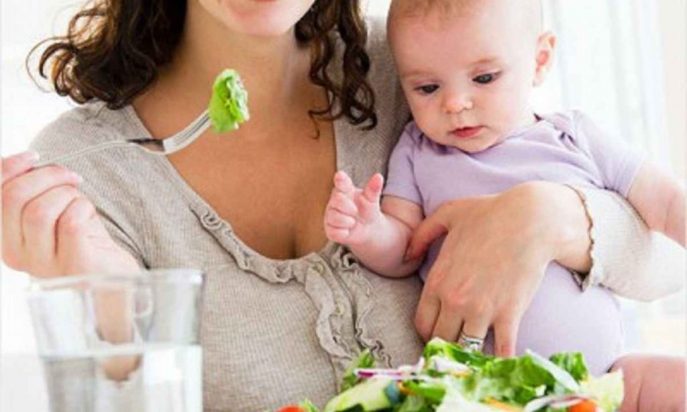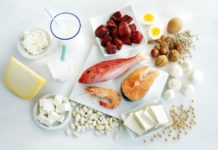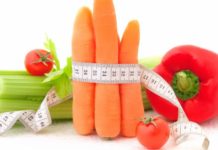A nursing mother must adhere to a special diet in order to maintain her own health and the health of the child. It is recommended to discuss the diet with a nutritionist who will take into account the woman's age, the presence or absence of diseases of the digestive system in her, whether lactation was carried out earlier. The menus are separately on the first day, the end of the first week, and the entire following month.
Material Content:
Postpartum Diet
In the first weeks, the diet should be as strict as possible, but a woman should not experience hunger. So, “new” names are introduced gradually and carefully so that the degree of their tolerance by the child can be determined. The principles are that:
- the menu should be as balanced as possible in the ratio of proteins, fats, carbohydrates. The same applies to calories, vitamin and mineral composition and dietary fiber;
- diet is recommended to be enriched with products that stimulate the production of breast milk. This is due to the fact that during the first weeks lactation is only established and the baby may not have enough milk;
- it is important to drink more fluids: compotes from berries or dried fruits, herbal teas, kefir, fermented baked milk.
The diet of a nursing mother involves eating food from five to six times a day, with breaks not exceeding four hours.
The diet for the first three days
During the first three days, it is recommended to use porridge on water (buckwheat or oatmeal with the addition of a small amount of vegetable oil) as a breakfast, as well as compote from berries or dried fruits. Cheese, as well as wholemeal bread or bread rolls are perfect as a snack.
An excellent lunch would be chicken broth (second broth), also in the diet can be boiled beef or poultry without skin, also twice boiled.
Afternoon snack is a light vegetarian soup with a small amount of potatoes or fruits, for example, baked apples and herbal tea.
For dinner, nutritionists recommend consuming steamed or baked vegetables, which are best green. Before going to bed, you can consume 200 ml of kefir, fermented baked milk from 1.5% fat.
Specialists pay attention to the fact that:
- already on the third day you can stop drinking water in large quantities. Volume up to one liter, which is especially true for problematic kidney function;
- to eliminate constipation, bran is introduced into the menu;
- Exotic fruits, vegetables and berries should not be consumed, because it is likely that an allergic reaction will develop in the child.
What to eat at the end of the first week after childbirth
The menu expands at the end of the first week after delivery, adding new ingredients to it - meat broth, brown rice, boiled fish, cottage cheese.
The menu should contain hypoallergenic fresh fruits and vegetables, a liquid volume of two liters or more.
The first breakfast is oatmeal porridge, 20 ml of weak tea and cookies (preferably dry). As a second breakfast, use 150-200 ml of yogurt, cookies or a cheese sandwich, it is permissible to replace it with cottage cheese.
An ideal lunch for a nursing mother would be 150 ml of meat broth, mashed potatoes with steamed cutlet. It is recommended to eat bread and 200 ml of dried fruit compote. In order for the baby to not have colic, an afternoon snack should also be full. The best option would be 150 gr. cottage cheese with the addition of sour cream, 200 ml of compote or jelly from dried fruits.
For dinner, you can eat stew with either a side dish of fresh vegetables or brown rice. The meat can be replaced with boiled fish, preferably with white meat. Do not forget about the use of herbal tea. Before going to bed, a woman is recommended to use 200 ml of kefir or fermented baked milk, cookies.
Recommended Nursing Mother's First Month Menu
Many people wonder what to eat mothers closer to the middle or end of the first month after childbirth. A sample menu is as follows:
- the first breakfast is cereal in milk with the addition of butter, where sugar or jam can be added if desired. Additionally, they use milk tea, cheese and bread;
- the second breakfast can be a banana or an apple, as well as natural yogurt, cookies;
- as a dinner, it is recommended to eat cabbage soup without preliminary frying, pasta with baked fish. Do not forget about grated carrot salad, bread, dried fruit compote;
- afternoon tea is cottage cheese with sour cream, compote, and also freshly squeezed apple juice;
- for dinner, it is recommended to use meatballs with a side dish of cereals or vegetables, a salad of fresh cucumbers and tomatoes, which are seasoned with vegetable oil with dill or parsley. An ideal complement would be tea with cookies or jam.
Before going to bed, it is advisable for a nursing mother to drink 200 ml of kefir or fermented baked milk, dry cookies. In between meals, it is permissible to use water (boiled or non-carbonated mineral). Also in the list of permitted items is herbal tea, fresh compote.
Diet restrictions
Improper nutrition of the mother can provoke colic in the child. That is why she is advised to consider the restrictions. The diet should not contain fish, meat or milk canned food, the same applies to vegetable marinades and homemade pickles. Ketchups, semi-finished products, whole cow's milk are harmful.
It is undesirable to include mayonnaise on the menu, any types of hot sauces (in addition to soy). It is recommended to refuse the use of legumes, strong black or green tea, as well as juices, coffee. An absolute limitation is alcoholic beverages. Also in the list are:
- dried fruits;
- White cabbage;
- fresh or frozen grapes;
- honey, because the likelihood of developing an allergy is high;
- nuts.
It is very important to exclude chocolate, processed or blue cheese from the diet, all varieties of sausages. As noted earlier, any of the items with a high degree of probability will cause colic in the child.
List of allowed products
The most useful and desirable are cereals (dairy or without milk), boiled or stewed vegetables (potatoes, zucchini, cauliflower). In a small amount, carrots and onions can be used. It is permissible to introduce low-fat beef, veal, rabbit meat, lean pork into the diet. Each of the presented varieties is either stewed or boiled, or steamed.
Special attention should be paid to chicken - boiled or stewed. Cooking is carried out without a peel. Vegetarian soups, as well as those prepared on the “second” meat broth, without preliminary frying, will be useful for mother and baby.
Sour-milk names, for example, cottage cheese, kefir, white natural yogurt, fermented baked milk, are extremely useful. It is important that each of the items be free of chemical dyes, flavors, flavors, as well as fruit and berry fillers. It is also permissible to eat bread: wheat, bran or rye-wheat, as well as dry cookies.
When should you follow a strict diet?
The most strict diet is necessary for women after gestational diabetes, as well as the implementation of cesarean section.
Specialists pay attention to the fact that:
- on the first day it is permissible only to consume water - most correctly still non-carbonated mineral with the addition of a small amount of lemon;
- on the second day, low-fat broths, cereals without added sugar can be included in the diet. Eating should be carried out in small portions, about six to seven times within 24 hours;
- on the third and fourth day, you can add cottage cheese, boiled meat, souffle, as well as unsweetened tea, broth from rose hips, compote. The volume of food for one time should be limited to 70-100 ml;
- by the end of the first month, the diet may include cereals, some vegetables and fruits, low-fat meat, sour-milk items.
Nutritionists pay attention to the fact that a healthy mother’s nutrition is extremely important when breastfeeding. No less important is the sleep and rest regimen - a woman needs to get enough sleep, because she should have enough strength, both for milk production and for feeding herself. It is recommended to wear the most comfortable clothes and such underwear that would not squeeze the chest.





























